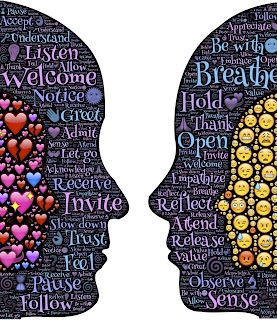Empathy: A Necessary Writing Skill
I saw a meme yesterday that struck a nerve with me. It related reading to empathy development. Research does exist to support the idea that reading offers many health benefits. Empathy and relationship-building happen to be some of them.
Not only does reading help develop empathy, but writers need empathy in order to write relatable stories.
What is empathy?
I spend a lot of time in my training workshops talking about empathy. Why? Because it's a crucial skill in effective communication. It, also, plays a huge part in exercising emotional intelligence (EI). Now don't scurry away at those terms, I'm going to talk about books, authors, and readers, not effective communication or emotional intelligence (although, they are important skills).
Most people define empathy as walking in another person's shoes or feeling the person's pain. Although these definitions are correct, they don't explore the full extent of empathy. Empathy is recognizing what another person is feeling, relating to that feeling from your own experience, accepting their feelings, and communicating this to the person. Brene Brown speaks about empathy and why it's different from sympathy in this great video clip. Check it out. It will help you grasp the meaning and importance of this skill.
Why is empathy important to writers?
In order to write a story from a character's point of view, we need to become that person and relate to their emotions and thoughts. How can you write someone's story if you don't seek to understand their inner thoughts and emotions? You can't. Even if the character is fictitious, a writer needs to develop awareness of how people will feel in a given situation and put that on the page. Not only recognize and become aware of their character's emotions, writers need to know enough about the character's background to realize how they will act and respond to circumstances. You can't do this if you don't empathize with your characters, even the evil ones.
How does reading increase empathy?
Books are written in someone's point of view. While reading a character's point of view, you will know what they think, see, smell, hear, taste, and touch. You will experience their inner thoughts. If they're worried, you will know from their reactions and thoughts about a situation. The same goes for every emotion the character feels. By delving deep into the character's mind and soul, you relate to that character. In fact, most people will not read a book where they can not relate to the character. If the writer did not do a good job of making the reader care about them, then the book will probably never get picked up by a publisher. If the book is self-published, the author might see poor sales due to the unrelatable nature of their characters.
When we care about a character, we want to read the book. We begin to understand other people's emotions and actions better by putting ourselves into someone else's life a while. It doesn't matter if the person is fictional. If the author possesses enough empathy to develop a relatable character, then we will be drawn in by their situation.
How can you develop empathy?
Read more! Studies show reading does play a factor in developing empathy for others. As a writer, look at how other authors' writing draws you into caring for their characters.
Books aren't your only avenue to developing empathy, though. When you're interacting with others, try to consider what the person is feeling. Once you have an idea, ask yourself why you identified that emotion instead of something else. What were your clues? And, then you can test it out by acknowledging their emotions. How do you do that? It takes practice, and it's not saying, "I understand." That statement is NOT empathetic at all.
Here are the steps to expressing empathy:
1. Listen to the person for clues to what they're feeling.
2. Identify the feeling.
3. Express it by saying, "It sounds like this has been very frustrating to you."
In this example, the emotion is frustration. You can insert any emotion in that statement. Don't worry if you're wrong. They will correct you if you identified the wrong emotion, AND they will appreciate that you are trying to understand.
Empathy. It's a magical skill that we can teach our kids and ourselves by reading more.
It's a necessary skill for authors.
Image courtesy of pixabay.com



Comments